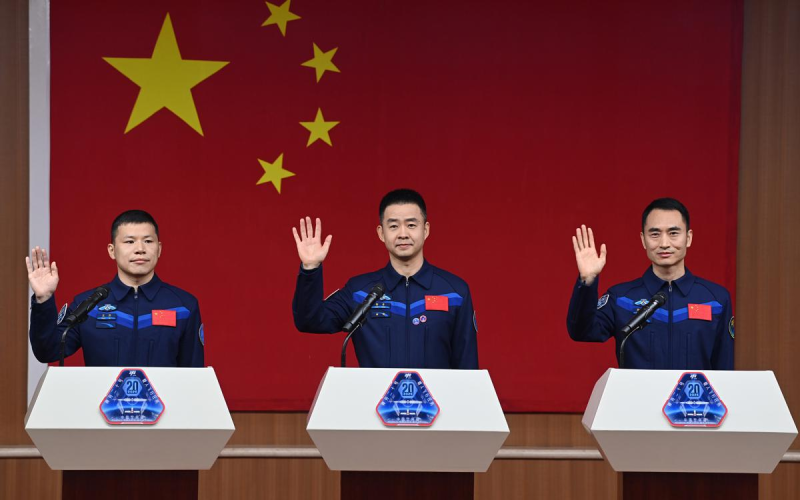Nation ready to launch new space mission for crew shift
Space: New crew to perform various tasks

Members of the Shenzhou XX crew, mission commander Senior Colonel Chen Dong (center), Colonel Chen Zhongrui (right) and Colonel Wang Jie, attend a news conference at the Jiuquan Satellite Launch Center in northwestern China on Wednesday. A Long March 2F rocket carrying the spaceship will lift off at 5:17 pm on Thursday. WANG JIANGBO / FOR CHINA DAILY
China is all set to launch its Shenzhou XX mission to make a crew shift onboard the nation's Tiangong space station, according to a senior program official.
A Long March 2F rocket carrying the spaceship will lift off at 5:17 pm on Thursday, said Lin Xiqiang, deputy director of the China Manned Space Agency, at a news conference held on Wednesday morning at the Jiuquan Satellite Launch Center in northwestern China. Thursday also marks China's 10th Space Day, which is observed annually on April 24.
The Shenzhou XX vessel will carry mission commander Senior Colonel Chen Dong, Colonel Chen Zhongrui and Colonel Wang Jie, who are all members of the People's Liberation Army Astronaut Division, to the space station, which is currently manned by their Shenzhou XIX peers.
Lin said the Long March 2F rocket was being loaded with propellants at its service tower on Wednesday.
"After the Shenzhou XX spacecraft enters its preset orbital position, it will activate the rapid autonomous rendezvous-docking mode, and take about six-and-a-half hours to approach and connect with the front port of the Tianhe core module," Lin said.
The Shenzhou XX crew will conduct China's 15th manned spaceflight and become the ninth group of residents aboard the Tiangong, which is currently the only operational space station independently run by a single nation.
Chen Dong and his team will take over the expansive orbital outpost from the Shenzhou XIX crew — mission commander Senior Colonel Cai Xuzhe, Lieutenant Colonel Song Lingdong and Lieutenant Colonel Wang Haoze — who arrived on Oct 30. As of Wednesday, Cai and his team have spent 175 days in orbit.
The two teams will stay together for approximately four days for transition work, after which the Shenzhou XIX astronauts will depart and return to Earth on Tuesday, according to Lin.
During their six-month orbital stay, the Shenzhou XX crew will perform various tasks such as conducting scientific experiments and technological demonstrations, performing spacewalks to install space debris shielding equipment, experimental instruments and other external devices, retrieving devices from outside the space station, and engaging in science lectures and other activities for public benefit.
This will mark the third space journey for Chen Dong, who participated in the Shenzhou XI mission in 2016 and the Shenzhou XIV mission in 2022, in which he served as the mission commander with Cai as a crew member. For Chen Zhongrui and Wang Jie, the upcoming spaceflight is their first extraterrestrial expedition.
Chen Zhongrui was a flight instructor at a PLA Air Force training base in Hebei province, before he was recruited by the PLA Astronaut Division. Wang Jie worked at the China Academy of Space Technology, a subsidiary of China Aerospace Science and Technology Corp, and took part in the research and development of a crucial technology to be used aboard the Tiangong.
Lin, the deputy director, said the members of the outgoing Shenzhou XIX crew have been in good condition, noting that they have conducted three spacewalks and their first was a new world record for the longest spacewalk. With a total of five spacewalks to his credit, Cai holds the record among Chinese astronauts.
During their mission, Cai and his team completed 88 scientific and technological tasks, covering life science, the basic physics of microgravity, materials science, space medicine and new spacecraft technologies, Lin said.
Flatworms in orbit
The Shenzhou XX mission will mark China's first space-based investigation into the regeneration of planarians, or flatworms, which are known for their extraordinary ability to regrow organs. These organisms can completely regrow their severed heads or tails, making them ideal candidates for the study of tissue regeneration mechanisms.
Lin said the experiments will deepen researchers' understanding of the basic mechanisms of regeneration at an individual level, and the results are expected to help address space-based health issues such as in-orbit injuries.
Different planarian segments will be studied as they initiate regeneration in orbit, with samples collected at critical intervals for fixation and imaging analysis, said Zhang Wei, director of the Technology and Engineering Center for Space Utilization at the Chinese Academy of Sciences.
Previously, zebrafish and fruit flies have been carried by astronauts to the space station for research and experiments.